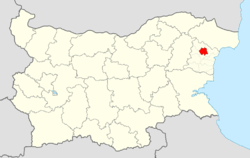Suvorovo Municipality
Suvorovo Municipality (Bulgarian: Община Суворово) is a municipality (obshtina) in Varna Province, Northeastern Bulgaria, not far from the Bulgarian Black Sea Coast. It is named after its administrative centre – the town of Suvorovo.
Suvorovo Municipality Община Суворово | |
|---|---|
Municipality | |
 Suvorovo Municipality within Bulgaria and Varna Province. | |
| Coordinates: 43°19′N 27°37′E | |
| Country | |
| Province (Oblast) | Varna |
| Admin. centre (Obshtinski tsentar) | Suvorovo |
| Area | |
| • Total | 216 km2 (83 sq mi) |
| Population (December 2009)[1] | |
| • Total | 7,544 |
| • Density | 35/km2 (90/sq mi) |
| Time zone | UTC+2 (EET) |
| • Summer (DST) | UTC+3 (EEST) |
The municipality embraces a territory of 216 km² with a population of 7,544 inhabitants, as of December 2009.[1]
Settlements
.png)
Suvorovo Municipality includes the following 9 places (towns are shown in bold):
| Town/Village | Cyrillic | Population[2][3][4] (December 2009) |
|---|---|---|
| Suvorovo | Суворово | 4,723 |
| Banovo | Баново | 137 |
| Chernevo | Чернево | 1,386 |
| Drandar | Дръндар | 185 |
| Izgrev | Изгрев | 210 |
| Kalimantsi | Калиманци | 214 |
| Levski | Левски | 173 |
| Nikolaevka | Николаевка | 494 |
| Prosechen | Просечен | 22 |
| Total | 7,544 |
Demography
The following table shows the change of the population during the last four decades.
| Suvorovo Municipality | ||||||||
|---|---|---|---|---|---|---|---|---|
| Year | 1975 | 1985 | 1992 | 2001 | 2005 | 2007 | 2009 | 2011 |
| Population | 9,410 | 8,273 | 7,913 | 7,658 | 7,115 | 7,293 | 7,544 | ... |
| Sources: Census 2001,[5] Census 2011,[6] „pop-stat.mashke.org“,[7] | ||||||||
Religion
According to the latest Bulgarian census of 2011, the religious composition, among those who answered the optional question on religious identification, was the following:
A majority of the population of Suvorovo Municipality identify themselves as Christians. At the 2011 census, 59.7% of respondents identified as Orthodox Christians belonging to the Bulgarian Orthodox Church. Muslims constitute the largest minority with 17.9% of the population.
References
- (in English) Bulgarian National Statistical Institute – Bulgarian provinces and municipalities in 2009
- (in English) Bulgarian National Statistical Institute – Bulgarian towns in 2009
- (in English) Bulgarian National Statistical Institute – Bulgarian villages under 1000 inhabitants – December 2009
- (in English) Bulgarian National Statistical Institute – Bulgarian Settlements 1000–5000 inhabitants – December 2009
- National Statistical Institute - Census 2001
- „pop-stat.mashke.org“
- "Population of Bulgarian divisions". Pop-stat.mashke.org. 2011-02-01. Retrieved 2012-03-28.
- "Religious composition of Bulgaria 2011". pop-stat.mashke.org.
External links
- Official website (in English)